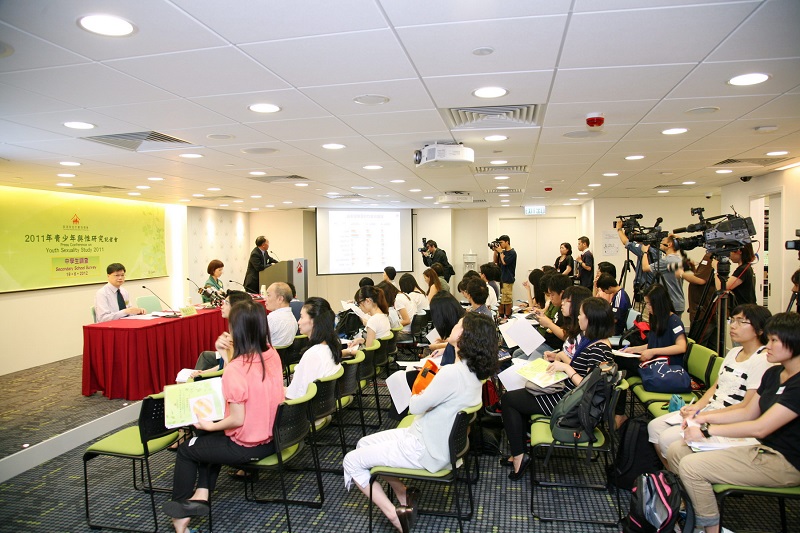Feature Articles
FPAHK Youth Sexuality Study 2011 (Secondary School Survey)
Ref Number: ESEAOR201208YSSa
- Date1 Aug 2012
- Category FPA Message
- Targets
- AuthorFPAHK
- Topic Sexuality Education, Sexual Behavior, Love & Dating, Family Planning and Contraception
FPAHK held a press conference on 19 June 2012 to release the findings of its seventh Youth Sexuality Study 2011 in which 3,775 secondary school students were polled from November 2011 to January 2012. Conducted every five years since 1981, this study series monitors patterns and trends among youths in respect of their sexual knowledge, attitude and behavior.
Sexuality Knowledge and Education
Form Three to Form Seven (F.3-F.7) students’ level of knowledge in terms of 12 key questions about conception, sexually transmissible diseases and HIV/AIDS remained more or less similar to that of previous years. Form One to Form Two (F.1-F.2) students, who were covered in this part of the Survey for the first time, were much less knowledgeable in these areas. Most students said they received sexuality knowledge from “teacher/ social worker”. The majority had also obtained sexual knowledge from other sources such as “friends/ schoolmates”, “television/ radio” and “internet/ online friends”. More respondents than in previous surveys agreed that “schools and parents should provide more sexuality education” and “sexuality education should become part of the mandatory curriculum”. Both girls and boys ranked “dating and love” and “adolescent development” as the top and second most wanted sex education topics, followed by “prevention and dealing with sexual harassment” for girls and “pre-marital sex” and “sexual health and STDs” for boys.
The findings revealed that students had high expectation on schools and relatively lower expectation on parents as providers of sexuality education. However, Dr Susan Fan, FPAHK’s Executive Director, emphasized that family sex education was indispensable and parents should not underestimate their role of guiding and supporting their children in matters of dating and intimacy and being a positive role model for cultivating values, attitudes and behaviours.
Dating Experience
Approximately 30% of respondents in F.1-F.2 and half of those in F.3-F.7 had dated the opposite sex. Most of them believed dating had no influence on their academic studies and about 10% of these girls and nearly one quarter of these boys in F.3-F.7 believed there was positive influence. Their dating partners were predominantly schoolmates or friends. 4% of girls and 3% of boys had homosexual experience.
Almost half of the respondents with dating experience had encountered conflicts and 70% had gone through breakup. Of concern was the fact that about 10% of these girls would harm themselves or others when facing conflict or breakup and about 6% and 3% of these boys would do so respectively.
Among the students who had commenced dating, their age of first dating mostly fell between 11 and 15 years old. Dr Fan advised that comprehensive sexuality education should begin as early as in primary school, and should cover not only theoretical knowledge but also include practical skills in interpersonal relationship and communication, conflict resolution and dealing with separation.
Sexual Intercourse Experience
In the F.3-F.7 group, 7% of girls and 10% of boys had experienced sexual intercourse, representing a drop after a continuous rise over the previous two decades. Among this minority group, the mean age of first sex was 15.3 years old for girls and 14.6 years old for boys. In the F.3-F.7 group, 3% of girls and 4% of boys had their first sex at the age of 15 or below.
Regarding the practice of safer sex, less than 40% of the F.3-F.7 respondents who practiced contraception in the past six months at the time of the survey used male condom or oral pills as the main contraception. This reflected the continued inadequate protection against unwanted pregnancy and infection among sexually active youth. Dr Fan urged parents, teachers and youth workers to approach the issue proactively and practically without embarrassment, as the consequences of unsafe sex could be devastating to the future wellbeing of these young people.







